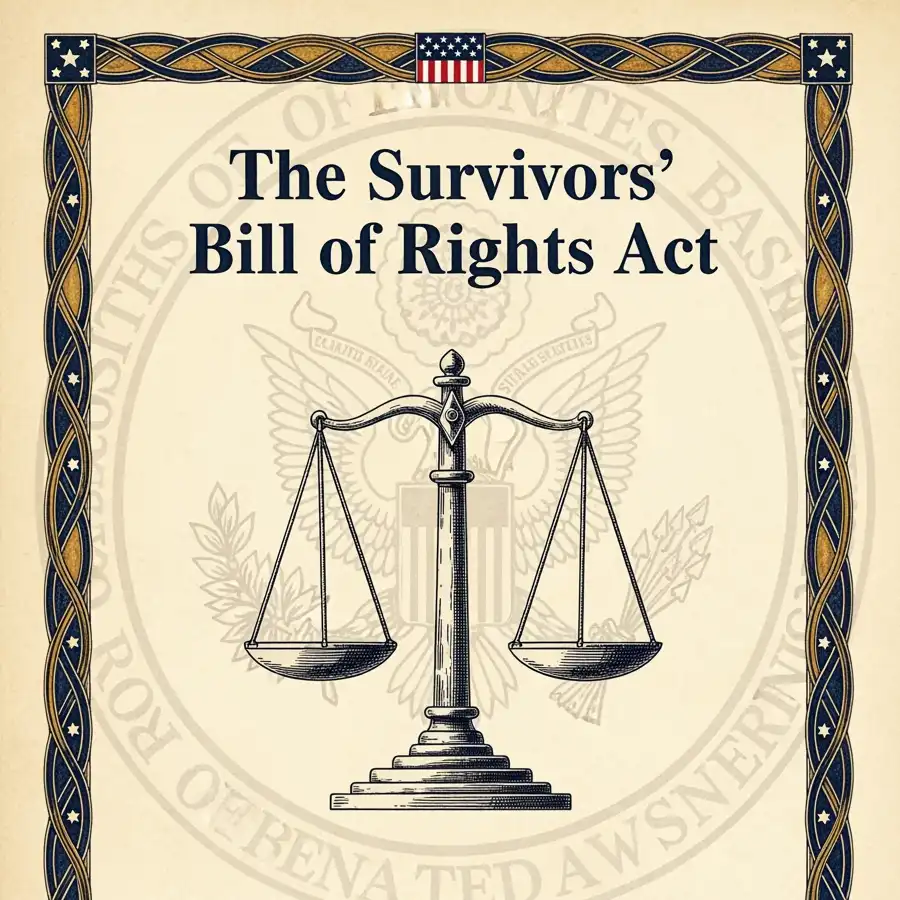Up until recently, survivors who reported sexual assault in the United States were met with a maze of bureaucracy, inconsistent protections, confusing processes, and, in some cases, no meaningful rights at all. The Survivors’ Bill of Rights Act of 2016 was crafted to change that. It established, for the first time at a federal level, clear rights for survivors of sexual assault in federal cases.
In general, the legislation provides survivors access to their forensic exam results, prevents rape kits from being destroyed prematurely, and eliminates exam fees. All of that is important. But the real power of this law isn’t only in its feel-good language; it’s in what it has meant for survivors trying to seek justice against institutions, corporations, and systems that once counted on confusion and silence.
Here’s a survivor-centered look at what this law actually does in the real world.
What the Survivors’ Bill of Rights Act Guarantees
Under the federal law, survivors have the right to:
A free sexual assault forensic exam
No survivor can be charged for the exam, ever.
Preservation of forensic evidence for at least 20 years
A survivor’s rape kit cannot be destroyed early, misplaced, or tossed due to “lack of room.” This is a massive shift; survivors can thank the survivor-led non-profit, End The Backlog for advancements in this area.
Notice before the kit is destroyed
If destruction is ever considered, survivors must be notified and given a chance to request continued preservation.
Access to the results of the forensic exam
No more being kept in the dark. Survivors have the right to copies of their own reports.
Information about the status of the kit
Survivors can request updates on testing status, results, and evidence transfer.
Although originally applying only to federal cases, the Act sparked a national movement. More than half of U.S. states have since enacted similar laws.
But survivors need more than rights on paper. They need real-world impact.
And this is where the Act matters most.
The Practical Impact
Loopholes fo institutions to escape liability.
Before this law, some institutions and agencies argued that evidence was destroyed “as a matter of policy” or “unintentionally lost.” That meant a survivor’s civil lawsuit might collapse before it ever began.
But now, evidence must be preserved, documented, and traceable.
If an institution — hospital, school, military base, corporate employer, boarding school, sports organization, church — mishandles evidence, they can no longer claim ignorance. They can be held accountable.
This dramatically strengthens many survivors’ ability to file successful civil claims.
Empowers survivors who are not ready to come forward immediately
Many survivors wait months, years, or decades before choosing to file a complaint or lawsuit.
Before 2016, evidence may have been tossed in a warehouse dumpster by the time they were ready.
But with the passage of the legislation, evidence is preserved for at least 20 years in federal cases, and many states have expanded that even further.
This means survivors retain the ability to pursue justice when they are ready, not when an arbitrary bureaucratic timeline forces them.
Equal footing for survivors and powerful institutions
Corporations, universities, churches, sports entities, and law enforcement agencies often have legal departments, data access, internal records, control over evidence, and the advantage of time (statute of limitations). Survivors typically have none of these legal advantages. But by granting access to forensic reports and preserving kits long term, the Survivors’ Bill of Rights Act shifts the balance; survivors no longer walk into legal battles empty-handed. These days, survivors may be legally protected with access to their own evidence.
More scrutiny against institutional negligence
If an institution ignored a report, discouraged reporting, failed to act, failed to preserve evidence, mishandled the kit or obstructed access, those failures can now be used as evidence of negligence. Many lawsuits today, especially against universities, hospitals, law enforcement agencies, religious institutions and corporations, rely on showing that an institution failed to follow proper procedures.
Thanks to the Act, those procedures are now legally defined.
Empowers survivors to stay informed and in control
Silence was once a powerful tool used by institutions to wear survivors down. However, thanks to the Act, survivors are now entitled to updates, results, status notifications. destruction notices, and full access to their own reports. This transparency makes it far more difficult for organizations to hide, minimize, or slow-roll/stonewall a case until the statute of limitations has passed. With the Act, survivors gain control over the timeline, not the other way around.
States have strengthened their own laws
Although the federal law applies only in federal jurisdictions, it created nationwide pressure. Today, many states now mirror these protections, with some states requiring even longer evidence preservation, while other states states guarantee survivors the right to an advocate during reporting. In addition, many states ensure survivors cannot be billed for hospital visits related to assault.
Filing a Claim Against an Institution or Corporation
Survivors who pursue civil lawsuits against institutional entities often rely on preserved evidence to show:
- grooming
- negligence
- predatory behavior
- systemic suppression of reports
- failure to protect minors
- failure to remove known offenders
Under the Act, the inability of an institution to provide this evidence or to explain mishandling often strengthens the survivor’s case, not weakens it. Institutions used to benefit from missing evidence; now they can be held liable for it.
The Survivors’ Bill of Rights Act Gives Survivors Time, Power, and Leverage
Thanks to the passage of this legislation, the Act has reshaped the landscape for survivors who may want to report, pursue criminal charges, or file a civil lawsuit years later. It ensures evidence is preserved, survivors are informed, and institutions cannot hide behind procedural failures. And for the first time in modern history, the Act tells survivors that their voice matters.
